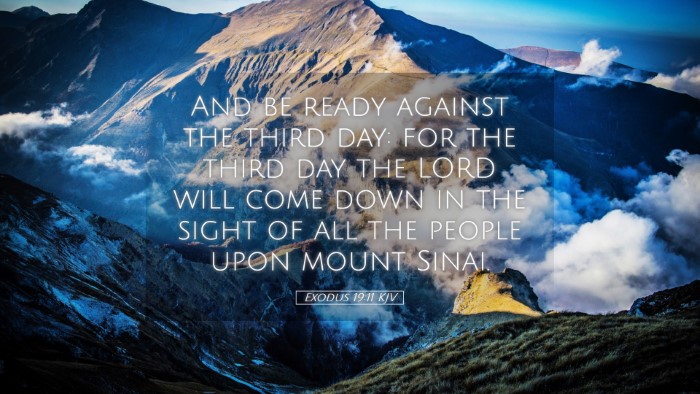Commentary on Exodus 19:11
Verse: "And be ready against the third day: for the third day the Lord will come down in the sight of all the people upon mount Sinai."
Introduction
This verse is a significant part of the narrative in which God prepares His people for a monumental encounter. It signifies God's impending revelation and the holiness required from His people in preparation for this divine presence.
Contextual Background
Exodus 19 occurs after the Israelites' deliverance from Egypt and their journey through the wilderness. They reach Mount Sinai, where they are to receive the Law. This chapter emphasizes God's desire to establish a covenantal relationship with Israel and the importance of holiness in that relationship.
Historical Context
Before this verse, God had called Moses to ascend the mountain (Exodus 19:3). He instructs Moses to relay the need for the people to prepare themselves spiritually and physically for a divine encounter. The mention of the "third day" signifies a specific time frame established by God for the people to sanctify themselves.
Theological Insights
- Divine Revelation: The phrase "the Lord will come down" indicates a direct revelation of God to His people. Commentators like Matthew Henry emphasize the majestic nature of this event, marking it as a pivotal moment in the life of Israel.
- Preparation and Holiness: The command to be ready highlights the essential theme of holiness in approaching God. Albert Barnes points out that this preparation reflects God’s desire for His people to be set apart, holy, and consecrated in the face of His glory.
- Anticipation of the Covenant: The coming of the Lord signifies the establishment of the covenant at Sinai. Adam Clarke explains that this event foreshadows other crucial events in biblical history where God's presence is made manifest to His people, ultimately leading to the New Covenant through Christ.
Commentary Excerpts
Matthew Henry: Henry focuses on the seriousness of the preparation. He states that "to prepare means to purify oneself, to separate oneself from casual or sinful behavior," which underscores the importance of self-examination and repentance within the community of faith.
Albert Barnes: Barnes adds a crucial point referencing the symbolism in the third day. He suggests that "the third day" not only signifies a wait but symbolizes resurrection and renewal, which has implications both in the immediate covenant context and for future messianic hope.
Adam Clarke: Clarke offers a more practical application, reminding us that the preparation required of the Israelites is echoed in the New Testament concept of being spiritually prepared for the coming of the Lord. He notes that believers today should take heed of the importance of being in a state of readiness for God's next move in their lives.
Practical Applications
- Self-Examination: This passage calls for believers to engage in self-examination, seeking God’s forgiveness and guidance in their lives.
- Collective Responsibility: The call to prepare reflects a communal responsibility. Pastors and leaders are encouraged to guide their congregations in holiness and sanctification.
- Anticipating God's Move: Just as the Israelites anticipated God's coming, contemporary believers are called to anticipate and prepare for God's actions in their lives and communities.
Conclusion
Exodus 19:11 serves as a powerful reminder of the holiness and majesty of God. It calls for preparation and reverence in the face of God’s revelation. As seen through the insights of various commentators, the themes of divine encounter, holiness, and communal responsibility have lasting implications for modern believers.


